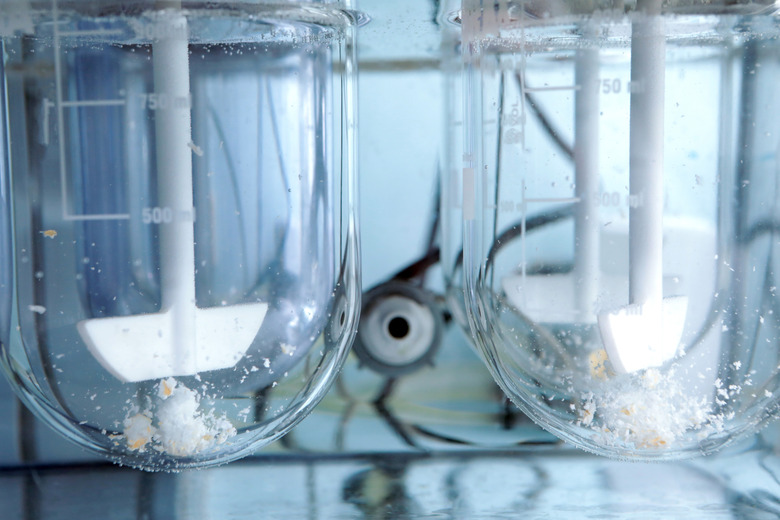What Happens When An Ionic Compound Dissolves In Water?
Ionic compounds are those composed of oppositely charged atoms, called ions, arranged in a lattice structure. Salts, including sodium chloride (NaCl) – table salt –are the best-known examples of ionic compounds. When you immerse an ionic compound in water, the ions are attracted to the water molecules, each of which carries a polar charge. If the attraction between the ions and the water molecules is great enough to break the bonds holding the ions together, the compound dissolves. When this happens, the ions dissociate and disperse in solution, each surrounded by water molecules to prevent it from recombining. The resultant ionic solution becomes an electrolyte, which means it can conduct electricity.
Do All Ionic Compounds Dissolve?
Do All Ionic Compounds Dissolve?
By virtue of the arrangement of the hydrogen atoms around the oxygen, each water molecule carries a polar charge. Its positive end is attracted to the negative ions in an ionic compound, while the negative end is attracted to the positive ions. The propensity for a compound to dissolve in water depends on the strength of the bonds holding the compound together compared to the strength exerted on the individual ions by the water molecules. Highly soluble compounds, such as NaCl, break apart completely, while compounds with low solubilities, such as lead sulfate (PbSO4) do so only partially. Compounds with nonpolar molecules do not dissolve.
How Ionic Compounds Dissolve
How Ionic Compounds Dissolve
In solution, each water molecule acts like a tiny magnet that creates a force of attraction on the ions in the solute. If the combined force of all the water molecules surrounding a solute is more than the force of attraction between the ions, the ions separate. As each one does, it is surrounded by water molecules, which prevent it from recombining. The positive and negative ions drift off into the solution. When all the water molecules have attached themselves to ions and no more are available, the solution is said to be saturated, and no more of the solute will dissolve.
Not all compounds are equally soluble. Some dissolve only partially because the concentration of ions in solution quickly reaches an equilibrium with the undissolved compound. The solubility product constant Ksp measures this equilibrium point. The higher the Ksp, the higher the solubility. You can find the Ksp of a particular compound by looking it up in tables.
Ions Turn Water Into an Electrolyte
Ions Turn Water Into an Electrolyte
The presence of free ions in water allows the water to conduct electricity, which is important for living organisms. Fluids in the human body contain positive ions such as:
- chloride
- carbonates
- phosphates
These ions are so vital to metabolism that they must be replenished when the body dehydrates through exercise or sickness. This is why athletes prefer electrolytic drinks to pure water.
Cite This Article
MLA
Deziel, Chris. "What Happens When An Ionic Compound Dissolves In Water?" sciencing.com, https://www.sciencing.com/happens-ionic-compound-dissolves-water-8425533/. 25 April 2018.
APA
Deziel, Chris. (2018, April 25). What Happens When An Ionic Compound Dissolves In Water?. sciencing.com. Retrieved from https://www.sciencing.com/happens-ionic-compound-dissolves-water-8425533/
Chicago
Deziel, Chris. What Happens When An Ionic Compound Dissolves In Water? last modified March 24, 2022. https://www.sciencing.com/happens-ionic-compound-dissolves-water-8425533/
